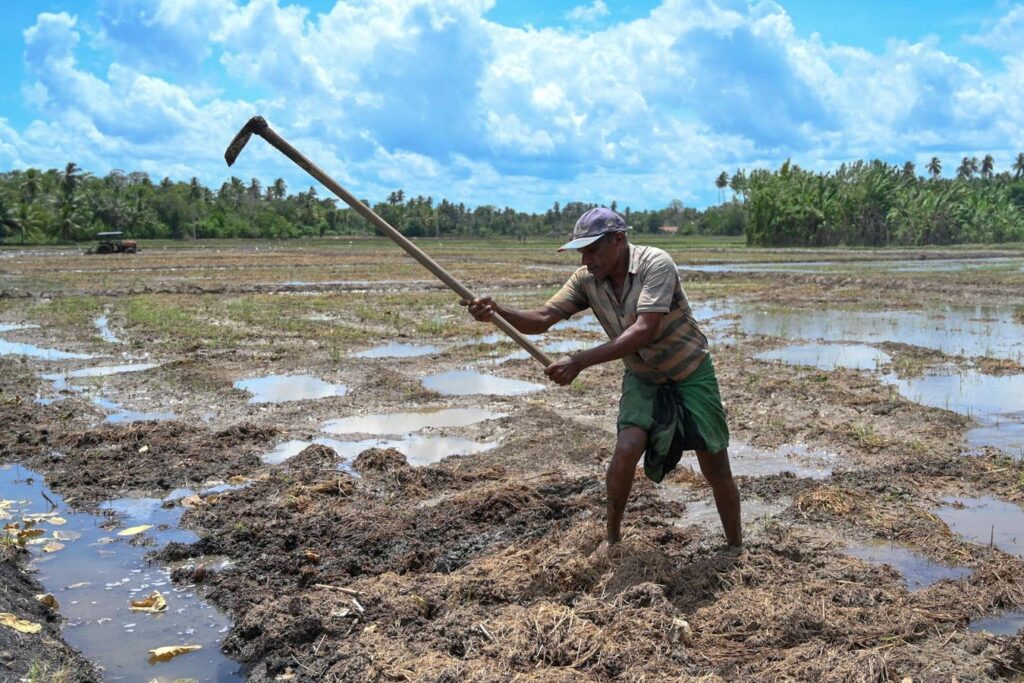TOPSHOT – In this picture taken on April 23, 2022, farmer Jinadasa Paranamana works in a paddy field … More
Prior to Israel’s recent attacks on Iran, energy prices and supplies were buffeted by the continuing war between Ukraine and Russia. Following the American bombing of three Iranian nuclear sites, Iran threatened to close the Straits of Hormuz, but quickly backed off. Following the Middle East ceasefire declare June 24, energy prices, which did not soar as might have been expected, stabilized, but remain high by recent standards. Brent crude is up more than 10% to over $76/barrel, and diesel in Europe has risen nearly 15%.
Like Iran, which targeted the Ashdod power station and the Haifa refinery during its most recent hostilities with Israel, Russia and Ukraine have also made it a point to target each other’s vital infrastructure, especially after Ukraine terminated Russian transshipments of natural gas to other parts of Eastern Europe. (Source). Indeed, Ukraine has intensified drone, missile, and bomb attacks on critical Russian infrastructure, from energy depots and logistics railways in Bryansk to major fertilizer plants in the Tula and Stavropol regions. At the same time, Russia has ramped up its bombardment of Ukrainian Black Sea ports and agricultural logistics hubs.
Shortly after Russia invaded Ukraine in February 2022, those two nations, along with Turkey and the United Nations, negotiated the “Black Sea Grain Initiative” in July 2022 as a way to protect the export of grain to the world. (Source). That deal, however, has not kept the cost of the inputs of food production stable. Russia has continued to strike the Ukrainian ports of Odesa, Pivdennyi, and Chornomorsk, which according to media reports have been widely used to launch drones attacking Russian warships. In doing so, they also have hit grain elevators and storage facilities, which had the exact opposite impact from the Black Sea Grain Initiative.
Globally, fertilizer prices already have risen 11% in the first quarter of 2025 compared to last year, per World Bank data. (Source). Nitrogen fertilizers like urea, essential for crops, jumped over 20%, with potash and phosphate up 18% and 20%, respectively. The recent Ukrainian drone strikes on the Novomoskovsk Azot plant and the Nevinnomyssk Azot plant, which have a combined output comparable to the annual nitrogen fertilizer consumption of France and Germany, have reportedly caused a temporary suspension of operations at these two facilities. While many are arguing (or speculating) about the true reason behind the attacks, as Ukraine had not attacked fertilizer plants before, the global food security and fertilizer markets are likely to suffer severe collateral damage no matter what the reasons for the attacks may be. European farmers are now confronting winter planting decisions against a backdrop of tightened supply and renewed market premiums.
It appears that Vladimir Putin may be trying to rerun the disaster that befell Sri Lanka in 2021, only this time caused by an outside stimulus. In Sri Lanka, President Gotabaya Rajapaksa decided to ban synthetic fertilizers and pesticides, forcing millions of Sri Lanka’s farmers to go organic. The decision, while wrapped in a concern for the environment, was ill-advised. It wound up precipitating a famine that ultimately destroyed Sri Lanka’s economy and caused the overthrow of President Rajapaksa himself. (Source). Meanwhile, in Ukraine, Putin is striking grain elevators and storage facilities. It is anybody’s guess what happens now if Moscow targets Ukrainian fertilizer plants like those in Rivne in retaliation for Ukraine’s strikes on Russian fertilizer plants. Beyond disrupting production, such an escalation risks an environmental catastrophe on the EU’s doorstep. The Tula and Stavropol strike already has pushed up prices on nitrogen-based products like urea and UAN by 6-10% in recent weeks, and threatens to add 20-40% to broader fertilizer costs.
Commodity markets already are impacted. In agricultural futures trading, wheat has jumped by 50-70% in some contracts during similar past disruptions. (Source). Analysts warn that any renewed Black Sea export interruption could trigger an equivalent surge within months. Corn, with Ukraine responsible for some 15% of all global exports, could spike another 30-50%, assuming U.S. and South American producers do not immediately ramp up acreage. The sunflower-oil market, dominated by Ukraine (50%) and Russia (17%), is particularly vulnerable: March 2022 saw a one-month price jump of 23% alone, and experts now predict possible increases of 40-60% during an export halt, with ripple effects raising palm and soy oil by 20-30%, as well. Earlier this year, Ukraine had to shut down one of its main sunflower plants at Kernel due to a raw material shortage. (Source).
Having brokered a ceasefire in the 12-day conflict in the Middle East, the United States has secured considerable diplomatic momentum and might use it to put the brakes on Russia and Ukraine’s escalating attacks on critical food and fertilizer infrastructure. For President Trump, the goal of averting a global famine would earn him high marks.
Read the full article here
